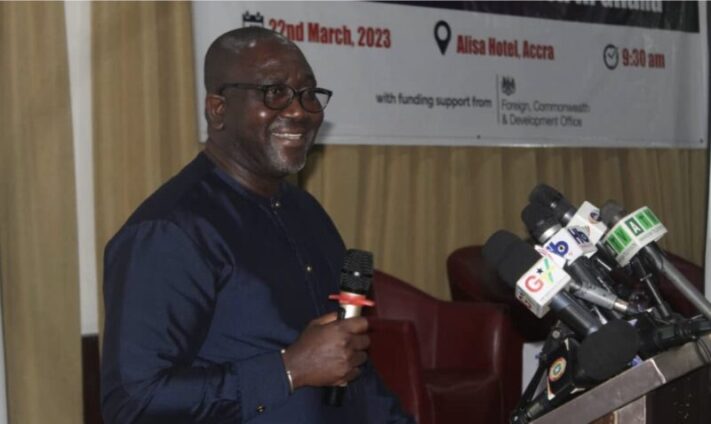The Executive Secretary of the National Media Commission (NMC), George Sarpong has urged the media to place Ghana’s peace above all else in their professional duties.
He stressed that a peaceful Ghana is essential for development, stating, “You are better off living in a peaceful Ghana with your preferred candidate losing than in a country up in flames.”
Mr. Sarpong made this call during a one-day dialogue with media practitioners, including radio and television hosts, producers, and political/current affairs programme presenters, held in Accra.
The event was organised by the Media Foundation for West Africa (MFWA) with funding from the U.S. Embassy in Ghana. It brought together media professionals from both public and private sectors.
The dialogue aimed to promote the use of respectful language in the media and tackle disinformation and misinformation.
“You are the ones we rely on to build peace in Ghana,” Mr. Sarpong remarked.
He also emphasized that democracy fosters development, as competing political parties often implement programs and infrastructure to legitimize their rule.
“Where there is no incentive for people to do anything to stay in power, they will not do anything,” he added.
Mr. Sarpong acknowledged the commitment of most producers and presenters to ethical journalism but also pointed out that a small minority of media professionals disregard these principles, often making their actions more conspicuous.
He urged those upholding the ethical standards to remain steadfast, reminding them that their efforts are valuable.
“Don’t think the peaceful moves you make don’t matter,” he said.
Dr. Kojo Impraim, Programme Director for Media for Peace and Sustainable Development at the Media Foundation for West Africa (MFWA), reinforced the importance of producers and presenters in shaping civil discourse within the media.
He shared findings from MFWA research, highlighting concerns that some media outlets give political figures a platform to act irresponsibly, which contributes to heightened political tensions in the country.
Findings from MFWA’s August 2024 report, Monitoring Indecent Language on Radio 2024, revealed that show moderators intervened to correct indecent language in only five per cent of cases, leaving 95 per cent unaddressed.
A follow-up report for September showed a slight improvement, with moderators attempting interventions in only 10 per cent of cases, leaving 90 per cent unaddressed.
Dr. Impraim explained that the organization had conducted the research every election year since 2012.
The goal, he said, was to reduce the incidence of abusive language on media platforms, reject divisive narratives, and encourage respectful political discourse.
Some participants in the dialogue highlighted the issue of media ownership by political figures, noting that media outlets are often used as tools to promote political agendas.
They suggested that indecent language persists, particularly during election periods, because journalists are pressured by media owners to allow such behaviour.
Participants also pointed to economic incentives and the low remuneration of journalists as factors that contribute to unethical conduct in the media.
Mr. Benjamin Alexander Davis, Chair of the Department of Multimedia Journalism at Morgan State University in the United States, advised the participants to differentiate between political propaganda and factual reporting, stressing the importance of prioritizing accuracy over speed.
He also encouraged media practitioners to work closely with the government to implement regulations that ensure a safe media environment for all.
Mr. Davis also urged journalists to keep abreast of advancements in Artificial Intelligence (AI) and 5G technology, noting that these innovations offered opportunities to reach more specific and hyper-local audiences.
Madam Gloria Hiadzi, Executive Secretary of the Ghana Independent Broadcasters Association (GIBA), expressed concern over the growing prevalence of disinformation and misinformation, which she warned posed a significant threat to peace and democratic governance.
She called on journalists and media personnel to adhere to ethical standards and help foster a media environment that serves the public good.
Madam Hiadzi said GIBA recognised the vital role the media played in Ghana’s democracy, providing a platform for citizens to engage in meaningful discussions on issues affecting them.
She also highlighted the importance of ongoing professional training to empower media personnel in fulfilling their roles effectively.
Mr. Matthew Asada, Press Attaché at the United States Embassy in Ghana, affirmed that the U.S. government had long supported Ghana’s democracy.
He mentioned that the U.S. was working to strengthen Ghanaian institutions, including the Coalition of Domestic Election Observers (CODEO), the Media Foundation for West Africa (MFWA), the Ghana Journalists Association (GJA), and Dubawa.
Latest Stories
-
Black Stars could miss key players for 2025 Unity Cup – Dr Randy Abbey
7 hours -
Pyramids grab late equaliser in African Champions League final
8 hours -
EU calls for ‘respect’ after Trump threatens 50% tariffs
8 hours -
Ronaldo ‘could play’ in Club World Cup – Infantino
8 hours -
Amorim tells Garnacho he can leave Man Utd
8 hours -
Djokovic makes more history with 100th singles title
8 hours -
Ten Hag set to replace Alonso as Leverkusen manager
8 hours -
Salis’ Sunderland secure Premier League return
8 hours -
Assin Fosu chiefs and elders bless TGMA Unsung Artiste of The Year, Yaw Darling
9 hours -
Middle-aged, 2 children trapped in their home after a fig tree sealed their frontage doors
9 hours -
Roots of resistance: The climate cost of cutting Accra’s trees
10 hours -
Reimagining Informality: Harnessing the Urban potential of street vending in Ghana
10 hours -
Former Yendi MP Dr Farouk Mahama donates towards funeral of late Mion chief
10 hours -
Ghana Gas board pledges accountability and staff support during operational tour
11 hours -
Burkina Faso’s uprising is a rebirth, not rebellion – Ras Mubarak
11 hours

